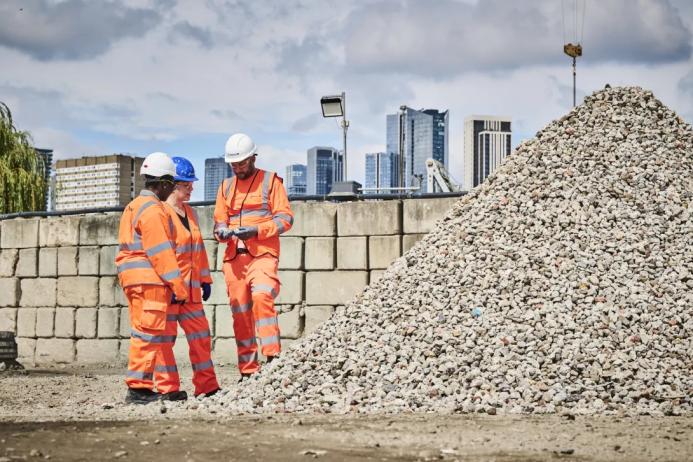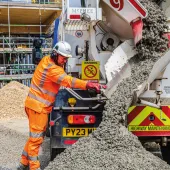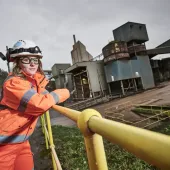Demand for circularity in construction on the rise
New Holcim research finds growing appetite for circular products that reduce reliance on virgin materials
THE appetite for circular products that reduce the reliance on virgin materials in manufacturing has increased significantly over the past year, according to new construction industry research by Holcim UK, who polled 500 UK decision-makers from across the construction industry both this summer and last year.
Almost all of the respondents (97%) to the company’s annual Circularity Survey stated they believe embracing the circular economy at their current organization is important, compared with 79% in 2024. Furthermore, over half of respondents (58%) feel it is ‘very important’, rising from around a third (35%) last year.
This increase in priority is also reflected in how construction professionals are setting targets around circularity. The number of businesses with specific circularity targets in place across all areas of their operations has increased by 36 percentage points (up to 57% from 21% last year). Only 2% of respondents report that their business has no intention to introduce targets.
Though focus on circularity is on the rise, the research also uncovered a need for more support across the supply chain to allow ambitions around the use of circular products to become a reality. Increased costs from disassembling materials was cited as the most pressing challenge by a third of respondents (34%), closely followed by the complexity of the concept of circularity (29%).
Ongoing labour shortages continue to hold back construction businesses from achieving their goals, with 26% citing a lack of specialist labour as a significant barrier to greater adoption of products made from post-consumer or industrial waste.
Amid a perceived skills gap around circularity, more companies are investing in building their knowledge around the specialism. Of the steps taken to increase reliance on a closed-loop supply chain, investing in employee awareness and education saw the biggest rise from 21% in 2024 to 30% in 2025.
The research also highlights the need for more government funding to be made available for training. Three in 10 (31%) would welcome more government investment in awareness and education, while a third (33%) want to see a prioritization of building specialist skills sets related to circularity.
Holcim commissioned their Circularity Survey to help the industry and government to understand the barriers preventing greater awareness and adoption of circular products and provide an annual benchmark for progress. It forms part of the company’s wider strategy to develop a closed-loop supply chain, including significant investment in its reuse and ECOCycle range, which recycles construction demolition materials (CDM) into new building solutions.

Kaziwe Kaulule, managing director of Holcim UK’s aggregates and CDM divisions, said: ‘The UK construction industry is entering a defining moment, balancing the drive for increased output with the urgent need to achieve sustainability goals.
‘Our research makes clear that closed-loop supply chains must be central to that future. Driven by our clear purpose of leading the way in circular construction, we are working hand-in-hand with partners across the value chain to remove barriers, accelerate progress, and make sustainable building practices the industry standard.’
The availability of circular products is also proving central to the selection of suppliers, with 94% deeming it a consideration when choosing a supplier over a rival brand. This has increased significantly from around seven in 10 (73%) last year. Over half (53%) now consider access to circular products as being ‘very important’ compared with just 28% last year.
While the cost of carrying out more recycling on site in the demolition process was cited as a barrier, the research shows, in contrast, that buyers are now willing to pay a premium for products capable of supporting their net-zero and circular economy targets. Some 87% of respondents stated they would be prepared to pay more for products and services from a company with strong circularity credentials.
An overwhelming 97% of survey respondents believe it is important to understand the full circularity information on all components and products – such as the level of recycled materials used in manufacturing – within a project. Over half (53%) believe this to be ‘very important’ compared with just over a quarter (27%) last year.
Developing a circular economy through pioneering solutions is central to Holcim’s mission of making sustainable construction a reality in the UK. The company’s ECOCycle range of aggregates, cement and concrete incorporates a minimum of 10% recycled construction demolition materials, allowing new to be built from old without compromising on performance. To further play their part in the roll-out of circular building solutions, Holcim UK are also aiming for 20% of their products to be made from recycled materials by 2030.
Danny King, managing director of Holcim UK’s Asphalt division, said: ‘Circularity is fast becoming a fundamental expectation from our customers, and together we’re proving that high-performance products can also be low-carbon and circular.
‘To ensure wider adoption within UK construction projects, solutions must be commercially viable, simple to access, and underpinned by vital product data and technical support. Through innovations like ECOCycle and significant investment in our CDM capability, we are embedding circularity at the core of everything we do in partnership with our customers.’










